
REPUBLIC OF SOUTH AFRICA

IN THE HIGH COURT OF SOUTH AFRICA
GAUTENG DIVISION, PRETORIA
CASE NO: 23465/2022
DOH: 12 JULY 2023
In the matter of:
MANTE MABLE SUSAN MPHAHLELE APPLICANT
And
JAKOBUS FREDERICK JOHANNES SCHEEPERS N.O. First RESPONDENT
(In his capacity as trustee/former trustee of the trust)
JOHANNES GERHARD NAUDE N.O. Second RESPONDENT
(In his capacity as trustee/former trustee)
THEUNIS WILLEM TREDOUIX N.O. Third RESPONDENT
(In his capacity as trustee /former trustee)
VUYOKAZI FUNEKA MEMANI- SEDILE N.O. Fourth RESPONDENT
(In her capacity as trustee/former trustee)
PIETER ISEBRAND HESLINGA N.O. Fifth RESPONDENT
(In his capacity as trustee/former trustee)
THE MASTER OF THE HIGH COURT, PRETORIA Sixth RESPONDENT
——————————————————————————————————————
JUDGEMENT - LEAVE TO APPEAL
THIS JUDGEMENT HAS BEEN HANDED DOWN REMOTELY AND SHALL BE CIRCULATED TO THE PARTIES BY WAY OF EMAIL/ UPLOADED ON CASELINES. ITS DATE OF HAND DOWN SHALL BE DEEMED TO BE 27 JULY 2023
———————————————————————————————————————
Bam J
A. Introduction
1. This is an application for leave to appeal the order of this court of 20 April 2023. The applicant’s grounds are set out in her Notice of Appeal and amplified in her Heads of Argument. The applicant bases her application on the provisions of section 17 (a) (i) and (ii) of the Superior Courts Act1. She says, there are reasonable prospects that another court would reach a different outcome and, that there are compelling reasons why the appeal should be heard as envisaged in Section 17 (a) (ii). The application is opposed by the respondents. They argue that it lacks merit and should be dismissed with costs, including costs of two counsel of whom one is senior.
B. The Law
2. The Superior Court Act2, makes provision for granting leave to appeal. Section 17 (1) (a) (i) and (ii) read:
‘Leave to appeal may only be given where the judge or judges concerned are of the opinion that—
(a) (i) the appeal would have a reasonable prospect of success; or
(ii) there is some other compelling reason why the appeal should be heard, including conflicting judgments on the matter under consideration;…’
3. In terms of how Superior Courts have interpreted the test, reference is made to Ramakatsa and Others v African National Congress and Another, the import of section 17 (1) of the Act:
‘‘Turning the focus to the relevant provisions of the Superior Courts Act (the SC Act), leave to appeal may only be granted where the judges concerned are of the opinion that the appeal would have a reasonable prospect of success or there are compelling reasons which exist why the appeal should be heard such as the interests of justice. This Court in Caratco, concerning the provisions of s 17(1)(a)(ii) of the SC Act pointed out that if the court is unpersuaded that there are prospects of success, it must still enquire into whether there is a compelling reason to entertain the appeal. Compelling reason would of course include an important question of law or a discreet issue of public importance that will have an effect on future disputes. However, this Court correctly added that ‘but here too the merits remain vitally important and are often decisive’. I am mindful of the decisions at high court level debating whether the use of the word ‘would’ as opposed to ‘could’ possibly means that the threshold for granting the appeal has been raised. If a reasonable prospect of success is established, leave to appeal should be granted. Similarly, if there are some other compelling reasons why the appeal should be heard, leave to appeal should be granted.…’3
4. In MEC for Health, Eastern Cape v Mkhitha and Another, the court sounded the warning in clear terms:
‘[16] Once again it is necessary to say that leave to appeal, especially to this court, must not be granted unless there truly is a reasonable prospect of success. Section 17(1)(a) of the Superior Courts Act 10 of 2013 makes it clear that leave to appeal may only be given where the judge concerned is of the opinion that the appeal would have a reasonable prospect of success; or there is some other compelling reason why it should be heard….[17] An applicant for leave to appeal must convince the court on proper grounds that there is a reasonable prospect or realistic chance of success on appeal. A mere possibility of success, an arguable case or one that is not hopeless, is not enough. There must be a sound, rational basis to conclude that there is a reasonable prospect of success on appeal.’
C. Applicant’s Grounds
5. The applicant’s ground may be summarised as follows:
‘5.1 The court erred in finding that the applicant waived all her rights including the right to information as contemplated in PAIA by virtue of accepting payment from the Retirement Trust.
5.2 The court erred in making the applicant’s right to information as contemplated in the Constitution and in PAIA conditional upon the non-payment of the amount of R 762 148.94 (the amount).
5.3 The court erred in concluding that the payment of the amount to the applicant per se amounted to a discharge of the Trust’s obligations towards the applicant and that the applicant cannot further be entitled to any claims against the Trust.
5.4 The court erred in finding that upon payment of the amount the applicant ceased being a beneficiary and as such lacks locus standi.
5.5 The court erred in concluding that the payment of the amount per se disqualified her from being a requester in terms of sections 1, 78 (2) (d) read with section 50 (1) (a) to ( c) of the PAIA.
5.6 The court erred in concluding that the payment of the amount to the applicant relieved the Trust and the Trustees from accounting to the applicant for the period commencing from the formation of the Trust alternatively for the period commencing from 5 June 2021 to date further alternatively, for the period in which the applicant was a beneficiary.
5.7 The court erred in finding that the applicant did not comply with the procedural requirements for requesting information as contemplated in section 50 of the PAIA.
8. The court erred in finding that the applicant failed to meet the standard to demonstrate that the right she sought to exercise and or protect. The court applied a stringent test instead of a flexible test. The test for identifying the right to be protected is not stringent; it is flexible and considers all the facts of the matter.
9. The court erred in not requiring the first to the fifth respondents to justify their refusal to grant the applicant access to information as requested.
D. Discussion
6. I had found, inter alia, as the judgement shows, that in requesting the information from the respondents, the applicant had failed to demonstrate the right she seeks to exercise or protect, as required by section 50 (1) of the PAIA. I had also found that the applicant had ceased being a beneficiary upon being paid the maximum benefit she was entitled to, as provided for in the Trust Deed and, because she had failed to challenge the award on review or on appeal, any claims she may entertain against the Trust have accordingly become res judicata. In reaching the findings, I had relied on the principles espoused by Superior Court and neither heightened or made unduly onerous the test that the applicant must meet. The applicant has not shown in any way that I had erred in the grounds advanced in her Notice of Application for Leave. Accordingly I find that another court would not come to a different finding. That disposes of the grounds based on Sections 17 (1) (a) (i).
7. On the question whether the appeal raises important issues of law, the applicant says the case raises important issues to her because it is concerned with her Constitutional rights of access to information. That might be the case but, here too, prospects of success are important. See Ramakatsa, paragraph 3 of this judgment. There is no merit to this ground.
8. The applicant further says I erred in failing to call upon the respondents to justify their refusal. The applicant had failed to meet the requirements set out in section 50 (1) as the judgement demonstrates. There is no merit to this ground at all.
E. Discussion on costs
9. The respondents have asked for costs including the costs of two counsel. Having considered the applicant’s Notice of appeal and the Heads of Argument, I am not persuaded that it would be reasonable of this court to award costs of two counsel.
F. Order
10. The application for leave to appeal is dismissed with costs.
——————————————————
BAM NN
JUDGE OF THE HIGH COURT,
PRETORIA
Date of Hearing: 12 July 2023
Date of Judgement: 27 July 2023
Appearances:
Applicant’s Counsel: Adv M Sikhakhane
Instructed by: Mabuza Attorneys
c/o Ledwaba Mazwai Attorneys
Nieuw Muckleneuk, Pretoria
First to Fifth Respondents’ Counsel: Adv C.E Puckrin SC, Adv L.G Kilmartin
Instructed by: Webber Wentzel Attorneys
Sandton, Johannesburg
3 (724/2019) [2021] ZASCA 31 (31 March 2021), paragraph 10.
